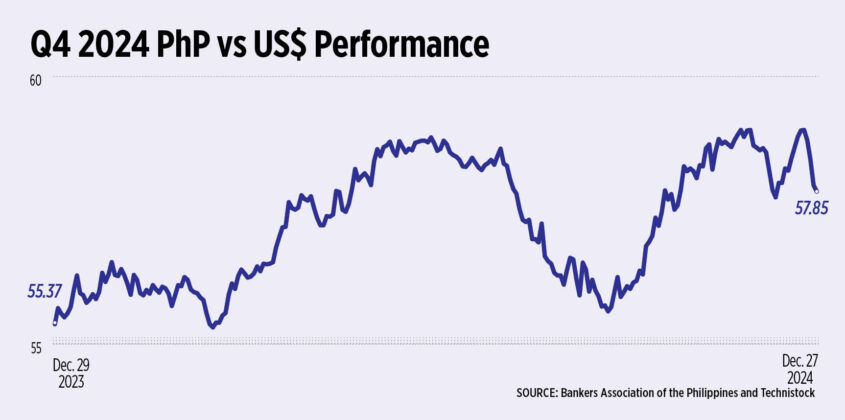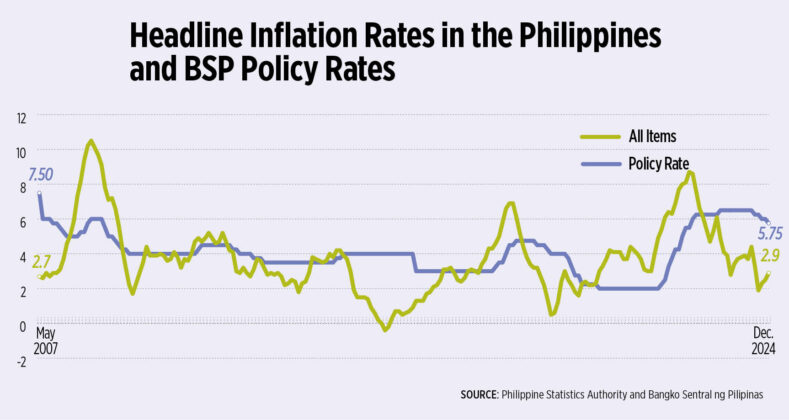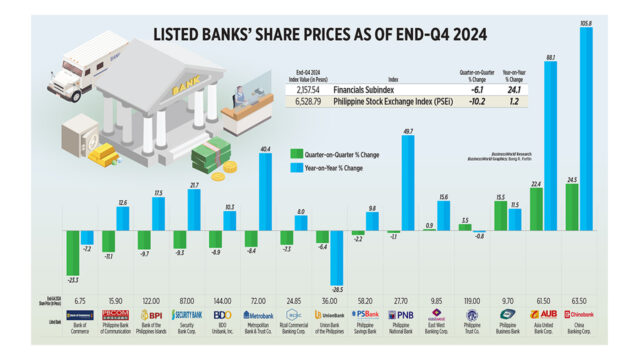US ECONOMIC POLICY uncertainties coupled with peso depreciation and policy rate cuts by both the US Federal Reserve and the Bangko Sentral ng Pilipinas (BSP) drove the local financial market in the last quarter of 2024.
These developments, analysts said, were likely to persist this quarter and throughout 2025.
In the fourth quarter, the Philippine Stock Exchange index (PSEi) — the barometer for the country’s stock market — closed at 6,528.79. This was lower by 10.2% from 7,272.65 in the July to September period last year.
A year earlier, the local bourse went up by 1.2% from 6,450.04.
Meanwhile, data from the Bankers Association of the Philippines showed the peso closed at P57.85 to the dollar in the October to December period, weakening by 3.2% and 4.5% from a quarter earlier and a year earlier, respectively.
Yields on government securities rose by 49.90 basis points (bps) on average quarter on quarter based on the PHP Bloomberg Valuation (BVAL) Service Reference Rates published on the Philippine Dealing System’s website.
On an annual basis, yields also grew by 21.81 bps.
During the period, domestic markets were influenced primarily by the reduction of interest rates set by the BSP and economic policies of US President Donald J. Trump, analysts said.
Harumi Taguchi, principal economist at S&P Global Market Intelligence, said that market sentiment has been influenced by uncertainties over US economic policy and expectations for fewer and slower policy rate cuts by the US Federal Reserve in the last quarter of 2024 which is still likely to persist this year.
For Nicholas Antonio T. Mapa, chief economist at Metropolitan Bank & Trust Co. (Metrobank), these projected economic policies set by Mr. Trump could have repercussions for global trade, global economic growth, and the direction of US Fed policy rates on the mind of investors.
“The new US administration is set to raise tariffs over the next four years. However, there remains a degree of uncertainty over the pace and magnitude of such tariffs, and whether other trading economies would retaliate by raising their own tariffs,” HSBC ASEAN economist Aris D. Dacanay said in an e-mail.
He added that market players will monitor how protectionism will develop, considering the inflationary risks of tariffs affecting how monetary policy in the US will take effect.
Meanwhile, for Sun Life Investment Management and Trust Corp. economist Patrick M. Ella, optimism surrounding the new US government was a big driver during the period.
Additionally, he said that the Philippine peso weakened alongside other Asian currencies following the win of Mr. Trump in November.
“Fixed income markets were elevated as the prospect of slightly elevated domestic inflation due to the weather-related disruptions to food supply and the seasonal demand,” he said in an e-mail.
He also added that the US Federal Reserve’s signaling a lowered rate cut this year helped keep both foreign and domestic interest rates higher.
Reinielle Matt M. Erece, economist at Oikonomia Advisory and Research, Inc. on the other hand, said that the BSP’s reduction of rates had a significant impact on the financial markets last quarter.
This suggests that further monetary policy easing measures are likely to happen.
However, he noted that uncertainties by Mr. Trump and his campaigns steered a great deal of uncertainty in our capital markets, causing foreign investors to sell and reposition themselves.
Due to this, the local bourse was not able to recover back to its October levels, he said, noting that the stock market rose to above 7,300 levels after the first rate cut of the BSP since the pandemic.
“This level of the PSEi was the highest since the first half of 2022 when the economy started to reopen,” he said.
Looking ahead, he said that interest rates and other economic indicators will fuel market movements this year.
Additionally, he said that economic uncertainty by Mr. Trump’s aggressive raise of tariffs on China and Mexico are still the reason why the stock market has a relatively weaker performance.
Earlier this year, he imposed tariffs on US’ key trade partners namely Canada, China, and Mexico which may have consequences in global trade.
Based on a weekly report by Capital Economics published in February, Mr. Trump has abandoned the idea to impose a flat universal tariff of 10%-20% on all imports to the US and instead favors for a new reciprocal tariff that will be imposed on a country-by-country basis.
A reciprocal tariff is a tax or trade restriction that one country places on another in response to similar actions taken by that country and the idea for this is to create a balance in trade between nations.
If one country raises tariffs on goods from another, the affected country might respond by imposing its own tariffs on imports from the first country.
To explain, governments impose tariffs to increase revenues and protect local industries from foreign competition.
On the other hand, locally, the central bank slashed its key rate by 25 bps to 5.75% in their Monetary Board meeting last December.
Since its easing cycle in August, the BSP has reduced rate by a total of 75 bps.
CENTRAL BANK HOLDS OFF RATE CUTS
But at its first policy meeting this year, the BSP maintained its policy settings, surprising market expectations and at the same time signaled fewer rate cuts this year.
Michael L. Ricafort, chief economist at Rizal Commercial Banking Corp., said that lower local interest rates would lead to decreased borrowing and financing costs.
This would then lead to an increase in the demand for loans and credit, and in turn, would result in more investments in new and expansion projects, improve trade, create more jobs, and boost business and economic activities.
For Mr. Taguchi, he also pointed out that policy rate cuts are likely to boost the economy and attract foreign direct investments in the country.
“This could limit further depreciation and support financial markets,” he added.
“Despite the hawkish stance from the [US Fed], I still see BSP to continue its easing cycle to encourage consumption and investments in the country amid the disappointing GDP growth report for 2024,” Mr. Erece said.
He added that while this may lead to the depreciation of the local unit, stable inflation coupled with weak growth will suffice to continue monetary policy easing.
“The BSP’s accommodative stance aims to ease financial conditions, supporting credit growth and economic activity while maintaining a target-consistent inflation outlook,” the central bank said in an e-mail.
BSP also said that following these rate cuts, credit activity has increased, and demand for government securities has been strong, with interest rates generally trending downward.
Additionally, the BSP highlighted that it remains in easing mode to support growth as well as continue gradual rate reductions.
This, alongside monitoring the impact of previous policy changes on the economy. It added that the future decisions on monetary policy will be data dependent.
WHAT TO CONSIDER IN 2025
Analysts highlighted significant developments that market participants should consider this quarter, and for the entire year, what trends will persist and how the market should take caution
For Mr. Taguchi, rising protectionism as well as geopolitical tensions are what market players should consider in 2025.
For Metrobank’s Mr. Mapa, the influence of Mr. Trump as he sat office will affect global trade, inflation, and geopolitical concerns.
“The full new tariff schedules that the US will impose, and the conditions attached will be a key source of attention for the market,” Sun Life’s Mr. Ella said.
On the other hand, Mr. Ricafort said that increased government spending on infrastructure and election-related expenditures for the May 2025 midterm elections could benefit manufacturers involved in supply chains for various infrastructure projects in which they may also gain from the campaign spending by candidates and their donors or sponsors.
Interest rates, coupled with energy prices and world politics, are factors that should be taken into account this year, Mr. Erece said.
He further explained that as the central bank continues its easing cycle, companies will invest in growth expansion which in turn will increase their capital expenditure.
Additionally, energy prices are seen to stabilize as world oil prices are forecasted to be on a decline.
Moreover, world politics may cause speculation and hesitation in capital markets.
“The ongoing imposition of tariffs by the US and the retaliatory tariffs set by other countries such as Canada will cause inflation expectations to rise,” Mr. Erece said.
Likewise, for the BSP, these external factors will impact domestic financial markets this year.
“In particular, markets will likely continue to be influenced by the protectionist trade policies and fiscal measures of the US, and the resulting policy uncertainty,” BSP said.
These factors, it added could put pressure on foreign exchange, equities, and bond markets, potentially delaying the US Federal Reserve’s easing cycle and affecting global output and inflation.
Additionally, the BSP noted that macroeconomic factors by goods exports, inflows from overseas Filipino workers’ (OFW) remittances and foreign direct investments (FDIs), and the continued implementation of structural reforms are expected to support the markets.
Latest BSP data showed that cash remittances reached $3.38 billion in December bring the full year 2024 level to $34.49 billion.
Meanwhile, FDI net inflows fell $901 million in November, its lowest in two months or since the $368 million in September, latest data from BSP showed.
Additionally, latest government statistical data showed that trade deficit in December narrowed to $4.14 billion, the smallest trade gap in nine months since the $3.35 billion posted in March 2024.
Exports for December 2024 declined 2.2% to $5.66 billion while imports likewise, fell by 1.7% to $9.79 billion.
The aggressive move on tariffs by the US administration will discourage investors from investing in riskier markets and opt for safer investment as central banks brace for the potential rise in inflation, Mr. Erece cautioned.
LOOKING AHEAD IN 2025
Fewer rate cuts this year would mean attracting more investments in the stock market plus encouraging companies to increase capital expenditure to strengthen business operations, Mr. Erece said.
He explained that lower interest rates incentivize business and consumers to spend or invest their money in capital markets instead of putting them in lower yielding government bonds. Moreover, in the long term, this will also help boost activity in the stock market.
For Mr. Taguchi, though the country is somehow insulated from risks looming over global trade, it may still be vulnerable to the Fed repricing and the greenback’s strength.
“The Philippine economy, due to its ongoing infrastructure agenda, is operating in a current account deficit, making it susceptible to risks in foreign exchange volatility,” he said.
Additionally, he noted that the US Federal Reserve puts a floor under how much the BSP can cut rates. If the BSP lowers rates more than the Fed, it could weaken the local unit.
This, in turn, will lead to inflation which is fueled by currency depreciation and will complicate BSP’s easing cycle.
“So, if inflation in the US turns out to be stickier due to tariffs, the BSP’s easing cycle might consequently be shallower, which, in turn, could limit the extent of how much Philippine equities and bonds could rally,” he explained.
FIXED-INCOME MARKET
BSP: The central bank’s shift to a less restrictive monetary policy, driven by easing inflation, is expected to influence bond yields. The BSP’s forward guidance will also impact on the fixed-income market.
Mr. Taguchi: Local bond yields are likely to remain around current levels, as US bond yields are expected to continue affecting local bond yields.
Mr. Mapa: Domestic liquidity and subdued inflation could keep a lid on interest rates in the coming months although supply risk and the direction of global rates could also mean rates could still be pressured higher during bouts of increased supply or uncertainty.
Mr. Erece: Bond yields can see a slow decline as inflation expectations continue to stabilize within targets. Other similar investment instruments will see the same movement for this year.
Mr. Ricafort: Market risk could be managed if the bonds/fixed income securities are held until maturity, or at least to have that flexibility, if market conditions become less favorable, such as if bond yields go up or remain elevated during the investment horizon, with the investor enjoying the effective yields or coupon payments every quarter or year (depending on how often coupon payments are made) that are more predictable (avoiding the risk of losses by not selling when market yields become higher than the yield during the bond’s purchase).
EQUITIES MARKET
BSP: Factors such as the proposed reduction in stock transaction taxes under the Capital Markets Efficiency Promotion Act, improved credit outlook, and higher domestic consumption, could boost trading activity.
Mr. Ella: [It] is cheap and could remain so until a good news story [lifts] prices.
Mr. Erece: As interest rate goes down, the risk-free rate usually goes along with it. Along with the expectation of higher business activity this year, the market risk premium is expected to increase, making stocks a more attractive instrument due to their relatively higher expected returns.
Mr. Ricafort: … Better corporate sales and income reports of the largest local companies and mostly better economic data recently to support investment valuations…. After no more large lockdowns since 2022, and no more lockdowns as a policy priority, going forward, thereby, improving sales or revenues, earnings or net income, employment or jobs, more business or economic opportunities; all of which would help support better investment valuations, though offset by still relatively higher prices and higher borrowing costs.
FOREIGN EXCHANGE MARKET
BSP: … Steady inflows from OFWs remittances, BPO revenues, tourism, and foreign direct investments are expected to support the peso. Additionally, ample gross international reserves will help cushion against global economic uncertainties and exchange rate volatility.
Mr. Taguchi: [We] expect the peso to remain above P58/US$ considering the likelihood of a policy rate cut by the BSP and the lack of change to the Fed’s policy rate.
Mr. Mapa: Taking its cue from the dollar and the direction of Fed policy.
Mr. Ella: [It] could trade sideways.
Mr. Erece: As the BSP is expected to deviate from the Fed’s movement, the peso is seen to depreciate slightly as the US [remains] in a relatively tighter interest rate environment. This will cause the exchange rate to hover around P58-P59 against the dollar.
Mr. Ricafort: Going forward, the performance of the US dollar/peso exchange rate would still be partly a function of intervention or defense as consistently seen for more than two years already amid the need to better manage inflation and inflation expectations to fulfill the price stability mandate that would also require stability in the peso exchange rate, which affects import prices/costs and overall inflation. — Abigail Marie P. Yraola





















